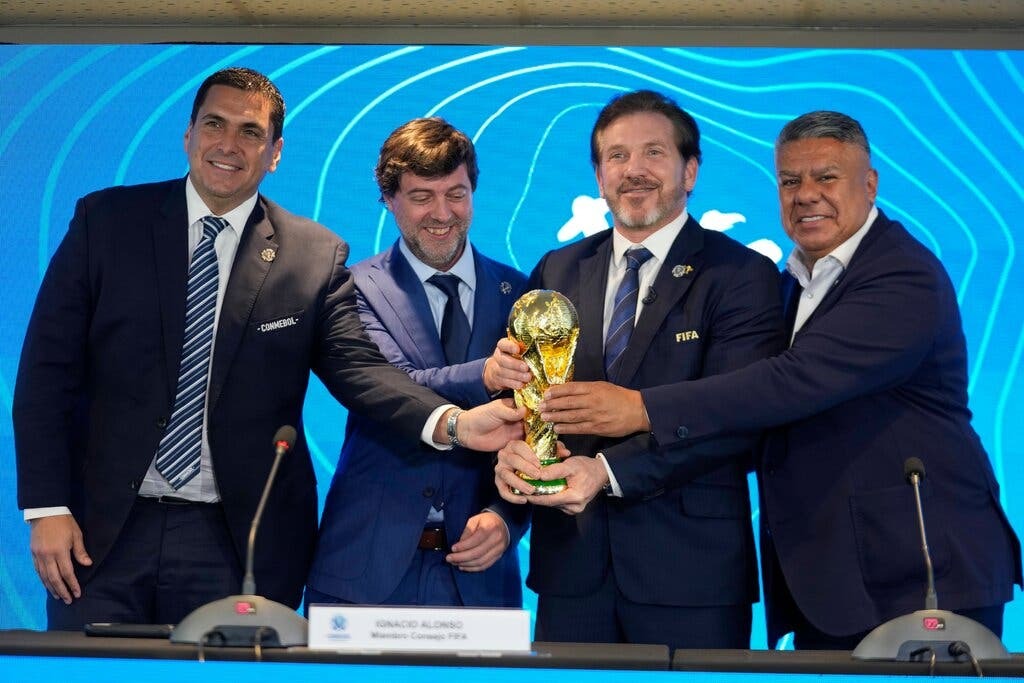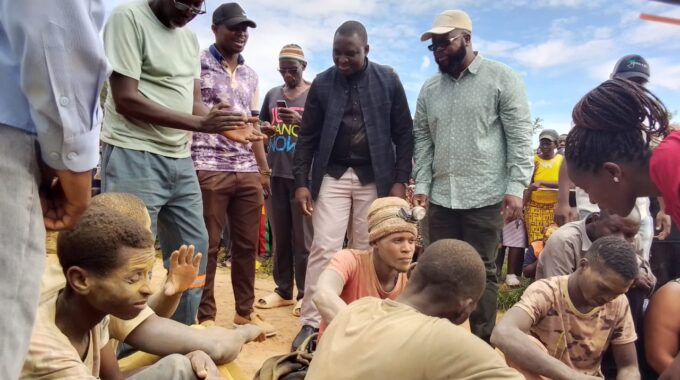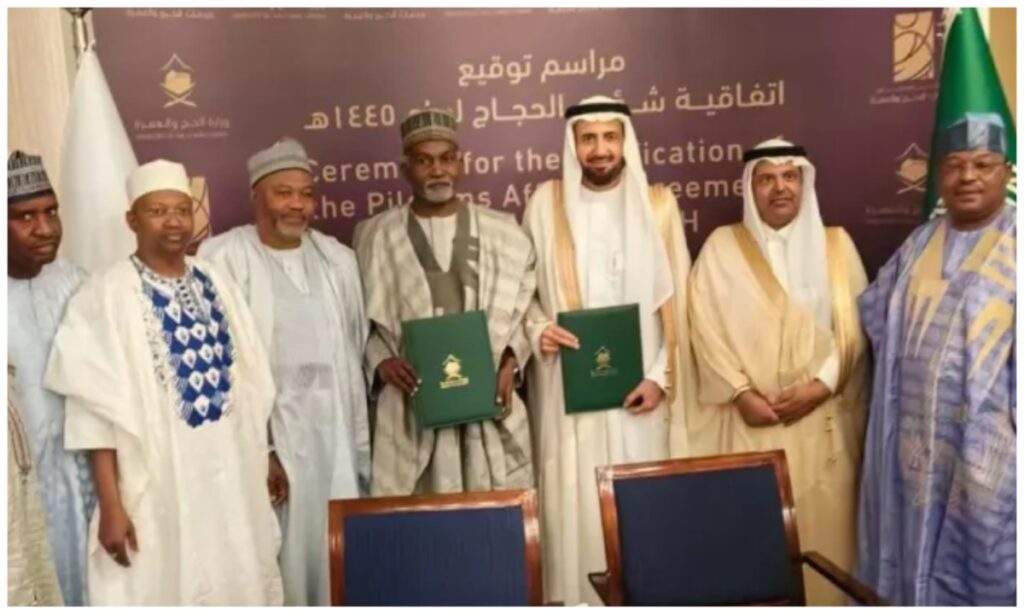In a groundbreaking announcement, FIFA revealed that the 2030 World Cup will be jointly hosted by Europe, Africa, and South America, with an added surprise—the tournament will commence with a commemorative celebration of its 100th anniversary in Uruguay.
The agreement, reached among the continental football leaders, stipulates that only one candidate will be accepted to host the 2030 tournament, as confirmed by FIFA. Initially comprising Spain and Portugal, the bid expanded this year to include Morocco, and it has now welcomed long-standing bid rivals Argentina, Paraguay, and Uruguay. All six national teams will be granted automatic entry into the 48-team tournament, according to FIFA.
This historic decision marks the first time the World Cup will be played across multiple continents. The inclusion of South America, with the opening match scheduled to take place in Montevideo, Uruguay, at the Centenario Stadium—the very venue where the inaugural 1930 World Cup final was hosted—is a significant draw. Alejandro Domínguez, President of the South American soccer governing body CONMEBOL, expressed the sentiment that “the centennial World Cup could not be far from South America, where everything began.” He further emphasized that the 2030 tournament would be held across three continents.
This consensus among once-rival soccer continents has also expedited the opening of the bidding process for the 2034 World Cup. The contest will be limited to member federations from Asia and Oceania, with Saudi Arabia having already expressed its interest, and Australia showing keenness after the successful co-hosting of this year’s Women’s World Cup alongside New Zealand. It is highly likely that the 2034 tournament will be held in November and December, similar to the schedule of the previous World Cup in Qatar.
The decision to accelerate the selection of the 2034 host, to be made by the end of next year, is seen as a triumph for Saudi Arabia and Crown Prince Mohammed bin Salman, who has cultivated close ties with FIFA President Gianni Infantino. Yasser Al Misehal, President of the Saudi soccer federation and a member of the FIFA Council, stated the country’s intention to bid, highlighting the desire to showcase their football culture and share their nation with the world.
While the FIFA Council’s acceptance of the unified 2030 candidacy still requires formal approval at a meeting of the 211 member federations next year, it is expected to be a mere formality. The selection for the 2034 host will be made at a separate congress.
Infantino expressed enthusiasm for the unique global footprint that the 2030 World Cup will offer, spanning three continents and involving six countries. He stated, “In 2030, we will have a unique global footprint, three continents—Africa, Europe, and South America—six countries—Argentina, Morocco, Paraguay, Portugal, Spain, and Uruguay—welcoming and uniting the world while celebrating together the beautiful game, the centenary, and the FIFA World Cup.”
The 2030 tournament, featuring 48 teams and 104 matches, is planned to commence with matches in Uruguay, Argentina, and Paraguay before transitioning to the core host nations of Spain, Portugal, and Morocco.
The ambitious travel requirements and time zone differences outlined in the plan have not been well-received by Football Supporters Europe (FSE), the officially recognized fan group of UEFA. In their statement, FSE criticized FIFA for perpetuating a cycle of destruction that they believe will adversely impact supporters and disregard environmental concerns. Additionally, they expressed concern about the decision to potentially award the 2034 hosting rights to a nation with a contentious human rights record.
While Chile’s inclusion in the South American co-host bid has been promoted since the 2018 World Cup, it was not mentioned in the recent announcement. Ukraine, which was added to the European bid last year, was also conspicuous by its absence from official comments about the UEFA-backed bid this year.
The United States, Canada, and Mexico are set to host the first 48-team men’s World Cup in 2026.
The selection of the 2030 host represents a significant triumph for Morocco, which has made substantial infrastructure investments in its major cities and was recently chosen to host the 2025 African Cup of Nations. The success of the Moroccan men’s national team, which reached the World Cup semifinals in Qatar and eliminated Spain and Portugal in previous rounds, further bolstered the country’s bid. Morocco will become the second African nation, after South Africa in 2010, to host the prestigious tournament.
In a statement, the Royal Cabinet of Moroccan King Mohammed VI hailed the selection as a recognition of Morocco’s esteemed position among great nations.
Spanish Prime Minister Pedro Sánchez, expressing concerns about the bid’s potential derailment if Luis Rubiales remained in office, emphasized Spain’s commitment to showcasing their country’s strength as champions of both the men’s and women’s World Cup titles. He further underlined the importanceTitle: Unprecedented Unity: Europe, Africa, and South America Join Forces for a Landmark 2030 World Cup
In an extraordinary move, FIFA has announced a groundbreaking decision for the 2030 World Cup, which will see Europe, Africa, and South America come together to host the tournament. The surprise addition of South America was made to commemorate the event’s 100th anniversary in Uruguay, where the inaugural World Cup final took place in 1930.
FIFA has reached an agreement among the continental leaders of football to accept only one candidate for hosting the 2030 tournament. The bid, initially led by Spain and Portugal, expanded this year to include Morocco and has now welcomed Argentina, Paraguay, and Uruguay as long-standing rivals. Notably, all six national teams will receive automatic entry into the 48-team tournament.
This historic decision marks the first time the World Cup will span multiple continents. The opening match will take place in Montevideo, Uruguay, at the iconic Centenario Stadium, paying homage to the tournament’s origins. Alejandro Domínguez, President of the South American soccer governing body CONMEBOL, emphasized the significance of hosting the centennial World Cup in South America, where it all began. He declared that the 2030 tournament will truly be a global event played across three continents.
The unity achieved by the once-rival soccer continents has also accelerated the bidding contest for the 2034 World Cup, which will be limited to member federations from Asia and Oceania. Saudi Arabia has wasted no time in entering this contest, with Australia expressing interest as well, following their successful co-hosting of the Women’s World Cup this year alongside New Zealand. It is highly likely that the 2034 tournament will be scheduled for November and December, similar to the 2022 World Cup in Qatar.
The decision to expedite the selection of the 2034 host by the end of next year is viewed as a victory for Saudi Arabia and Crown Prince Mohammed bin Salman, who has established close ties with FIFA President Gianni Infantino. Yasser Al Misehal, President of the Saudi soccer federation and a member of the FIFA Council, expressed their country’s intention to bid and emphasized the desire to showcase their football culture and open their nation to the world.
While the FIFA Council’s acceptance of the unified 2030 candidacy still awaits formal approval at a meeting of the 211 member federations next year, it is expected to be a mere formality. The selection for the 2034 host will be made at a separate congress.
Infantino expressed his excitement about the unique global footprint that the 2030 World Cup will create, spanning three continents and involving six countries. He highlighted the significance of welcoming and uniting the world to celebrate the beautiful game, the centenary, and the FIFA World Cup. The tournament, featuring 48 teams and 104 matches, is scheduled to commence with matches in Uruguay, Argentina, and Paraguay before transitioning to the core host nations of Spain, Portugal, and Morocco.
The ambitious travel requirements and time zone challenges outlined in the plan have faced criticism from Football Supporters Europe (FSE), the officially recognized fan group of UEFA. FSE expressed their concerns, stating that FIFA’s decisions disregard the fans, the environment, and potentially award the hosting rights to a nation with questionable human rights records.
Chile’s inclusion in the South American co-host bid, promoted since the 2018 World Cup, was not mentioned in the recent announcement. Similarly, Ukraine, which joined the European bid last year, has not been mentioned in official comments regarding the UEFA-backed bid this year.
The United States, Canada, and Mexico are set to host the first 48-team men’s World Cup in 2026.
The selection of the 2030 host represents a significant victory for Morocco, which has made substantial infrastructure investments in its major cities and was recently chosen to host the 2025 African Cup of Nations. The success of the Moroccan men’s national team in the previous World Cup, where they reached the semifinals and eliminated Spain and Portugal, further bolstered the country’s bid. Morocco will become the second African nation, after South Africa in 2010, to host the prestigious tournament.
In a statement, the Royal Cabinet of Moroccan King Mohammed VI expressed their pride in the selection, stating that it recognizes Morocco’s esteemed position among great nations.
Spanish Prime Minister Pedro Sánchez, expressing concerns about potential bid derailment, highlighted Spain’s commitment to showcasing their country’s strength as champions of both the men’s and women’s World Cup titles. He further emphasized the importance of upholding values such as equality, solidarity, and fair play in sports.









No comment yet, add your voice below!